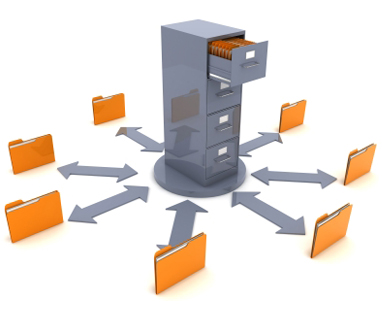

At the centre of every company is its data. Whether documents, financial records or contact lists, they're an essential asset to your firm and need to be kept safe, secure and accessible. Here at Mamu Computing we understand the importance of providing the appropriate solution for you. This could be as simple as a shared folder on a computer or as complex as a cluster of servers. We also understand how mobile the modern office is - that's why we offer access to your files from outside the office. Take a look at our 'Remote Access' solutions for more information.
In addition to making your files accessible to every employee, centralising your data storage simplifies the process of backing up. Most solutions we provide ensure no data is lost in the event of hardware failure and provide automatic back-up to an offsite location in case of fire or theft. As a result a central storage solution provides peace of mind that your data is safe and, if the worst were to happen, it could save your business.
If you're looking at organising and sharing your files more effectively, then give us a call or email to discuss the solution that suits you.
| Unsure of some of the terms we've used? We've handpicked a few definitions for you below, or you can visit our glossary for a comprehensive list. Click on 'read more' to see the full definition. | |
| Cloud Computing: Cloud computing refers to various online services, particularly the ability to store, edit and retrieve your files online by using online data storage. The 'cloud' refers to the internet, representing the network of online services, and any... read more | |
| Data Management: Data management is the way in which computer data is handled and managed, and incorporates everyone from individuals right up to very large organisations. Whereas individual users will find that regular back-ups and up-to-date security and ... read more | |
| File Transfer Protocol (FTP): File Transfer Protocol (FTP) is a method of transferring files between computers over a network (LAN or Internet). It is commonly used to upload, change and delete files on a web host in order to edit a web site. FTP requires two software c... read more | |
| NAS: NAS stands for 'Network Attached Storage' and allows files to be saved in a single location accessible over the network. A NAS can be as simple as an external hard drive connected to the local network or a large bank of hard drives in a ser... read more | |
| RAID: RAID (redundant array of independent disks) is storage technology for combining several disk drives in order to increase performance, resiliency and/or capacity, depending on the RAID architecture used. RAID systems can operate at a lower l... read more | |
| Terabyte (TB): A terabyte is the equivalent of 1 trillion bytes, or 1,000 gigabytes, and is used to measure memory capacity. It is bigger than a gigabyte, but smaller than a petabyte. Currently hard drives are usually measured in gigabytes (or 'gigs'), bu... read more |